- Home
- Bette Lee Crosby
Blueberry Hill
Blueberry Hill Read online
BLUEBERRY HILL…
A Story of Sisters
by
BETTE LEE
CROSBY
BLUEBERRY HILL, A Story of Sisters
Copyright © 2014 by Bette Lee Crosby
Cover design: Valentine Design
All rights reserved. No part of this publication may be reproduced or transmitted in any form by any means, electronic or mechanical, including photocopy, recording, or information storage and retrieval system without permission in writing from the author, except by reviewers who may quote brief passages for a review to be printed in a newspaper, magazine or journal.
This is intended to be a work of fiction although it is a memoir of sorts. As in many stories, the literary perceptions and insights are based on life experiences and the conclusions drawn from years old memories. Should there be any inaccurate names, places or dates, I apologize and blame it solely upon years of trying to forget the things that are most painful.
ISBN-13: 978-0-9960803-3-0
BENT PINE PUBLISHING
Port Saint Lucie, FL
For Donna…
I love you and miss you still.
Sisters
My sister killed herself, and I will forever carry the weight of it being partly my fault. I didn’t hand her a weapon, but I looked the other way.
I didn’t just look the other way; I envied her lifestyle. If given the chance, I would have gladly become her: carefree, irresponsible, and living every moment to the fullest. Of course, back then we had no way of knowing what harm could come from a bit of fun. It was simply a few drinks and a cigarette.
I was the eldest of three sisters, and, according to Mama, responsible for any and all wrongdoing of my siblings. This rule applied regardless of my involvement or lack of involvement in the event. Whether the baby smeared crayon across the bedroom room wall or Donna came home carrying the smell of a skunk, Mama held me responsible.
“You’re the oldest; you know better,” she would say. “It’s up to you to watch your sisters and make sure they stay out of trouble.”
“But, Mama,” I’d argue, “I wasn’t even there!”
“Doesn’t matter. You’re the oldest and you’re responsible.”
Curtailing anything Donna did was like trying to slow the winds of a hurricane. Even now as I look back and try to remember how it all began, I know I couldn’t have done anything. Donna was who she was, and nothing would ever change her. She was a female version of Fonzi, the popular character from the 1970s show Happy Days. She was the popular girl, the cool girl, the one everybody tried to emulate. Looking at Donna in those teenage years, you could easily believe she was destined to live a golden life. But things don’t always turn out the way we expect.
In that last year, I asked her, “If you could do it all over again, would you do anything differently?”
She shrugged. “Maybe.”
That was about the closest I ever saw Donna come to having regrets.
In the Early Days
For as far back as I can remember, Donna would set her eye on something and go after it with such gusto that she couldn’t possibly fail.
The earliest evidence of this came when she was seven and entered a Dairy Queen Contest. The prize was whatever the winner wanted—a sundae, a banana split, a blizzard, anything. She just had to put her name on the entry form and drop it in the box. The minute that slip of paper left Donna’s hand she began planning what she’d choose when she won.
She dropped her entry in the box on Monday, then went back on Tuesday to check when the drawing would be held.
“Saturday,” the kid behind the counter told her. “Not until Saturday morning.”
For the whole week she counted off the days. Five more days ’til Saturday…four more. Three more, until at last Saturday came.
At eight-thirty on Saturday morning, Donna was there, ready and waiting, but the Dairy Queen didn’t open until ten o’clock. So she sat on the curb and waited. When they finally slid the service window open she hurried over.
“Is it time for the drawing yet?” she asked.
“Not yet, kid,” the clerk answered. “About noon, that’s when we do it.”
Disappointed, but not defeated, she sat back down on the curb and continued to wait. That’s when I came into the picture. Donna had been gone for several hours, and Mama sent me to search for her. Having accomplished my mission I plopped down on the curb beside her, and she told me the story.
~ ~ ~
“The guy at the window told me pretty soon,” Donna says. “He promised pretty soon they’re gonna pull the lucky name.”
She smiles this big, wide, toothy grin and with all the confidence in the world tells me, “I’m gonna win. I know I’m gonna win. If you stay here, I’ll share some of my banana split.”
You hate to tell your kid sister she’s nuttier than a fruitcake, but… She’s the only kid there, nobody else in the entire parking lot, and she’s been sitting there for more than three hours waiting to win this banana split.
“Mama told me to bring you home,” I say.
“Not now!” she says with a gasp. “He’s almost ready to announce the winner!”
I know spending another hour there is sure to get us both in trouble, but what the heck. I wait while she goes up to the window for what was probably the fourth or fifth time.
“Is it time yet, mister?” she asks.
“Yeah, it’s time.” With that the guy sticks his hand in this box and pulls out a piece of paper. Without showing it to anyone, he looks at her with wide-eyed pretense. “Holy cow, I can’t believe this! What did you say your name was, kid?”
“Donna, Donna Sue Motley.” My sister’s face now shows an ear-to-ear smile.
“You’re the winner,” the guy says with a reasonably straight face. “Yeah, you’re sure enough the winner.”
“I’m the winner! I’m the winner!” Donna screams, jumping up and down. “I knew it, I just knew it.”
“Okay, kid, you can have a banana split, a sundae, or anything else you want.”
“I want a banana split,” she says, “with two spoons.”
“Here you are; two spoons.”
The guy hands her the biggest banana split I have ever seen in all my life. We sit there on the curb and eat the whole thing. On the way home she says, “See, I told you I was gonna win.”
~ ~ ~
Looking back, the grownup me knows it most likely wasn’t her name on that piece of paper, but it doesn’t matter. Donna got the prize because she had the tenacity and grit to believe.
Of course this was one of those magical things that happened way back when I still believed her stretch of life would one day be paved with streets of gold.
Shortly after school started that fall, Mama got sick. For three days straight she remained in bed. Daddy made dinner all that week, and then on Friday afternoon he came home early and took her to the doctor. They came home smiling, so I had to assume there was nothing much wrong.
On Saturday afternoon Mama took Donna and me to the Sweet Shoppe for sodas, and we had what she called a woman-to-woman talk.
~ ~ ~
“Doctor Lavine told me and your daddy that we’re going to have a baby,” Mama explains. “So until I get to feeling better, you girls will have to pitch in and help with the household chores.”
Once that’s out in the open, Mama spends the duration of her talk detailing the responsibilities of older sisters. Donna doesn’t buy it, but I puff myself up with a sense of importance. The way Mama makes it sound, I’m practically going to be in charge of the newborn baby. (In retrospect, I believe it was the “in-charge” part that was the charmer.)
Donna is not of the same opinion.
“Can’t yo
u tell the doctor you don’t want the baby?”
“Why would I do a thing like that?”
Donna scrunches her face and frowns.
Thinking Mama might give weight to such a thought and cause me to lose my newly-acquired level of responsibility, I jump in. “I think it’s neat we’re going to have a baby sister.”
“Sister?” Donna echoes. “That’s even worse. Tommy Barnes has a new baby sister, and she cries all the time.”
“All babies cry,” Mama says.
Given that fact Donna continues to argue in favor of no baby or at the very least have it be a boy. “Where’s that baby gonna sleep?” she asks, then quickly adds, “Not in my room, I hope.”
“I’m thinking you’ll move over and share Bette’s room; then I can put the baby in your room,” Mama says.
“Oh, great,” Donna grumbles.
The baby issue is not off to a great start as far as Donna is concerned, and she spends the next six months hoping it’ll be a boy.
When the baby finally arrives the following February it’s a girl. Donna is so disappointed she asks Mama if she can get a dog because she didn’t get a brother. Mama says no, she’ll have to learn to live with a sister.
~ ~ ~
For several months Donna grumbled about the fact that I got a girl baby like I wanted and she couldn’t even have a dog.
“If I can’t have a dog,” she said, “how about a cat?”
The answer was still no.
The following July Donna decided to do something about getting herself a pet. It was generally a sure sign of trouble when Donna took matters into her own hands.
~ ~ ~
When I open the door I all but faint from the smell. There stands Donna with her friend, Alma. They have a skunk locked in a wooden crate. It’s not one of those tame, de-skunked critters. No, this is the real thing. The two of them had gone into the woods, set a trap, and caught a skunk!
“Mama!” I scream. “You’re not going to believe what Donna did!”
“Blabbermouth,” Donna says with a scowl.
Mama gets a whiff of that skunk long before she reaches the door. Standing at the far end of the kitchen, she hollers for me to have both kids strip down to their bare skin out there on the porch. “Then take their clothes down to the incinerator,” she adds.
“Not me,” I say, “I’m not touching that stuff.”
“You’ve got two seconds to get going,” Mama says and waggles a finger in the direction of the garbage room.
Mama puts both kids into a hot tub of soapy water and scrubs until their skin turns red. She does it a half dozen times, but when we go to bed that night Donna still stinks.
“Don’t you know skunks can’t be pets?” I ask.
Donna is still mad at this point, so she rolls over, faces the wall, and doesn’t bother to answer.
~ ~ ~
The year I turned thirteen I made two very important discoveries. I learned that I had no athletic ability whatsoever, but I also figure out I was blessed with a fair bit of business sense. Both of these revelations surfaced the day Donna showed me how to ride a two-wheel bike.
~ ~ ~
A number of small New Jersey towns are tucked behind the cities. They’re places few people have heard of and fewer still have visited. Ridgefield was just such a place. Most kids rode their bike to school. I say most kids because there was a handful of misfits who, like me, didn’t.
Patty was one too. Walking to school meant walking uphill, and Patty didn’t do uphill. She couldn’t. She was so overweight I doubt there was a bicycle with a sturdy enough seat. Her mother drove her to school. I walked.
Walking to school was bad enough, but walking home was more often than not a humiliating event. I usually ended up walking alongside Patty. We were in the same class and we traveled in the same direction; it was unavoidable. Once I lingered behind thinking she’d be long gone when I left, but she was there, waiting.
“What happened?” she asked. “Mister Lorenzo keep you after class?”
“I was cleaning out my locker,” I lied.
Even though the walk home was downhill, Patty huffed and puffed like a dying steam engine. I should have helped her. I should have offered to carry her books or stopped long enough for her to catch her breath. But I didn’t.
I was at the age where everyone’s opinion counted and when kids laughingly called out names like Fatty Patty. I cringed. I was afraid that through the factor of association I would forever be linked to the fat girl, the outcast. Now I look back and think how shallow such thoughts were, but when you’re a shy teenage girl a breeze is seen as a windstorm. Everything is a threat to your fragile image.
~ ~ ~
After months of walking home alongside Patty, I finally break down and ask Donna to teach me how to ride a two-wheel bike. I sit on the stoop in front of our house watching her circle past me on the walkway like the bareback queen in a circus act, and all the while I’m thinking I am never going to be able to do this.
“It’s easy,” Donna yells. She pulls back on the handlebars, does another whirly, then lets go and still doesn’t fall. The truth is I wish she would—not hard enough to actually break something, just hard enough to injure her ego.
It’s a sibling rivalry thing. All kids have it. You might not always see it but it’s there, mixed in with brotherly or sisterly love. It shows its ugly face in the ordinary moments of life, but when hearts are broken or lives shattered it inevitably gives way to love.
“Come on! I’ll show you how if you do that report for me!”
Grudgingly, I say I’ll do her book report if she’ll teach me how to ride the bike. She agrees.
I climb on the bike and get seated. The oval courtyard now looks like the Indianapolis Speedway. Donna says not to worry, she’s going to steady the bike and run beside me as I circle the walkway.
“Maybe we’d better start with something smaller.”
“Smaller?” She gives me a look. “Start pedaling.”
I do, and she runs beside me steadying the bike. Unfortunately, the second she lets go the front wheel wobbles and I topple over. I wasn’t going very fast so there wasn’t far to fall. Nothing but my pride is injured. We repeat the process over and over, but I can’t move past my fear of failure.
Two hours and a dozen falls later, we take a break and flop down on the grass mogul beside the mailboxes. The two-story brick buildings circling the courtyard line up like Monopoly houses. Each of these buildings has a front porch littered with tricycles, pedal cars, and other toys. I know a lot of these kids because I babysit for them on Friday or Saturday nights when their parents go to the movies or an Elks Club dance. The families trust me because I don’t bring boyfriends over like some of the high school girls. Besides, they know my mother is nearby and keeps an eye on me.
As I sit there rubbing my shin, Missus Keller sticks her head out the door and warns her redheaded toddler, “Don’t you dare take a step off this porch, Bobby.”
The kid defiantly starts down the steps, and the mother yells again.
“Get back up here! One more step, and you’re in trouble!”
Bobby looks back at his mama then scrambles down the other three steps and takes off running across the courtyard. Seconds later poor Missus Keller starts chasing after Bobby; she’s got his baby sister tucked under her arm.
By now the baby is screaming and the two-year-old terror is staying just out of reach, laughing like it’s a big joke. Without realizing it, he runs toward me. I nab him and hold him until his mother gets there.
In between yelling at Bobby and jiggling the crying baby, Mrs. Keller hands me two quarters and says, “Thanks, Bette. I wish I had someone like you to keep an eye on him every morning so I could get my housework done in peace.”
I can’t believe my ears. “You mean you’d pay a babysitter to watch him even if you’re at home?”
“Um-hmm. The only problem is I can’t spare more than five dollars a week. I doubt a sitter wo
uld take a job for such poor pay.” With that, she trots back across the courtyard, both kids in tow.
I turn to Donna. “Did you hear that?”
“Yeah, so?”
“So?” I repeat. Now I am on the knowing end of the conversation. “If I could make five bucks for every kid in this development, I’d be rich.” I start counting the number of porches with kid toys.
“You’ll be babysitting all summer. You won’t have any time for fun.” Donna scrunches her face into a look of disdain. “That’s nuts.”
“But if I watch them all together, at one time…” Now the wheels have started turning.
“At one time?” Donna says. “How?”
“I can have the mothers bring them to the kiddie playground every morning at nine o’clock and come pick them up at noon. We could organize games and let them play with each other—”
“Whaddaya mean ‘we’?” Donna says. “I’m not babysitting those mean kids.” She shakes her head side to side. “No way.”
“You’d be a partner. Make a lot of money.”
“Unh-unh!”
“It would only be three hours a day.”
“Weekends?”
“No weekends,” I promise.
“How much money?”
“Depends on how many kids we get.” I start doing the math in my head. “We could charge five dollars for the whole week. That way it’d be so cheap all the moms will want their kids to come. I’ll bet we could get at least twenty kids. That’s one hundred dollars.”
“I get half?”
“Of course not,” I say, knowing I’ve got the upper hand for once. “It’s my idea, and besides, I’ll have all the business responsibility.” A look of doubt starts creeping across her face so I quickly add, “But you’ll get two dollars for every kid we watch. That’s forty dollars a week.”
Now she’s interested. “Forty dollars? No working in the afternoon?”
“Yeah, providing we get twenty kids.”
~ ~ ~

 Emily, Gone
Emily, Gone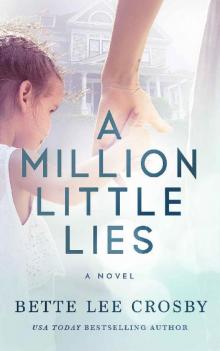 A Million Little Lies
A Million Little Lies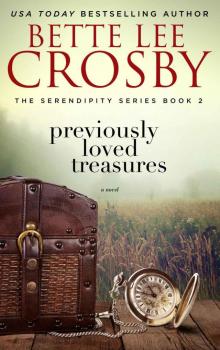 Previously Loved Treasures
Previously Loved Treasures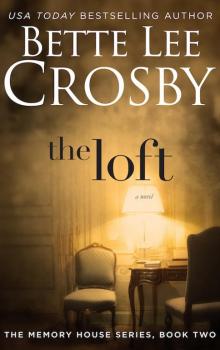 The Loft
The Loft Spare Change
Spare Change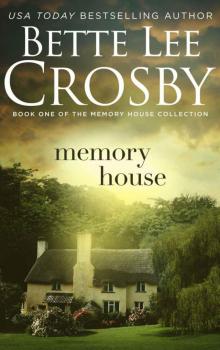 Memory House: Memory House Collection (Memory House Series Book 1)
Memory House: Memory House Collection (Memory House Series Book 1)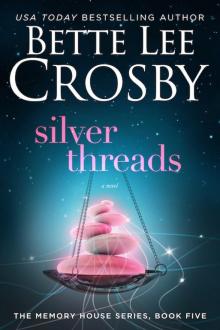 Silver Threads
Silver Threads Wishing for Wonderful: The Serendipity Series, Book 3
Wishing for Wonderful: The Serendipity Series, Book 3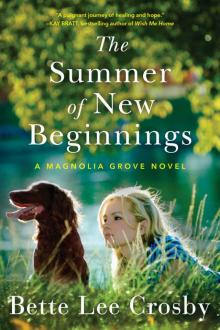 The Summer of New Beginnings: A Magnolia Grove Novel
The Summer of New Beginnings: A Magnolia Grove Novel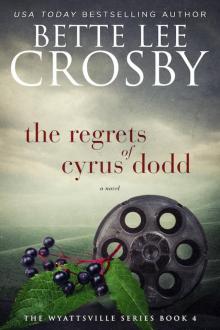 The Regrets of Cyrus Dodd
The Regrets of Cyrus Dodd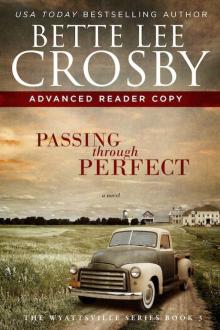 Passing Through Perfect
Passing Through Perfect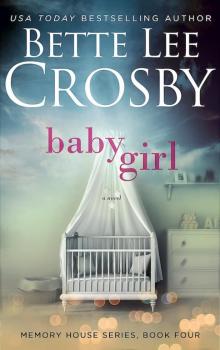 Baby Girl
Baby Girl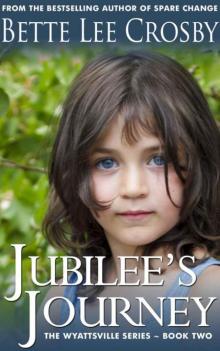 Jubilee's Journey
Jubilee's Journey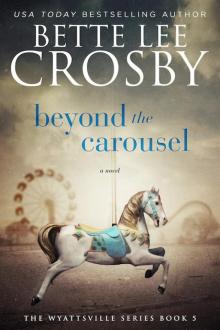 Beyond the Carousel
Beyond the Carousel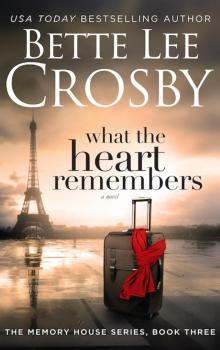 What the Heart Remembers
What the Heart Remembers Cupid's Christmas
Cupid's Christmas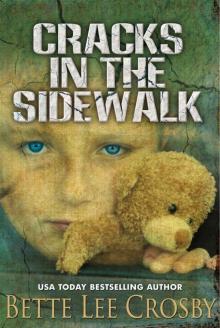 Cracks in the Sidewalk
Cracks in the Sidewalk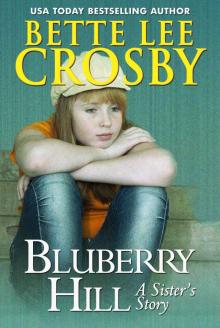 Blueberry Hill
Blueberry Hill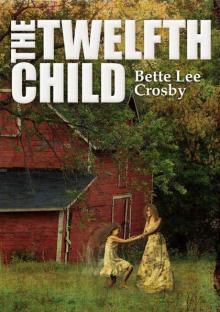 The Twelfth Child
The Twelfth Child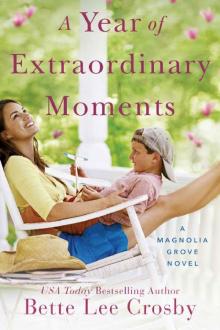 A Year of Extraordinary Moments (A Magnolia Grove Novel)
A Year of Extraordinary Moments (A Magnolia Grove Novel)